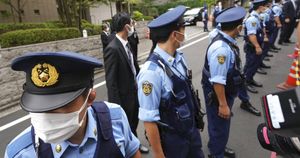The Indonesian government is considering extending the copper concentrate export permit for PT Freeport Indonesia (PTFI) after the company experienced a fire at its smelter last October. This potential move stands out as Indonesia has recently imposed a comprehensive export ban on raw minerals, including copper, as part of its commitment to encourage onshore processing of mining outputs.
Tri Winarno, the Director General of Coal and Mineral Resources at Indonesia’s Energy and Mineral Resources Ministry, elaborated on the government's position. He stated, "Basically, Indonesia has banned the export of copper concentrate. There must be trigger to allow the export," highlighting the significance of assessing specific conditions before permitting exports to continue.
The fire incident at PTFI's smelter facility located within the Gresik Special Economic Zone (KEK) took place last October and halted production due to the damages incurred. Winarno disclosed after the ministry's investigation concluded the fire's cause appears unintentional, possibly attributed to issues within the electrical system. "I do not say short circuit. But there was a problem in the electricity system," he noted, emphasizing the need for clarity on the situation before actions can be taken.
Following the incident, PTFI submitted a request for relaxation of the copper concentrate export rules after the expiration of its previous permit on December 31, 2024. The company's President Director, Tony Wenas, confirmed the dire situation, stating, "It’s still completely stopped. If it’s being repaired, it’s impossible to produce," reinforcing the urgent need to assess the possibility of reopening export channels to sustain operations.
Elaboring on the timeline for recovery, senior official Elen Setiadi of the Coordinated Ministry for the Economy indicated tentative plans for the smelter to resume limited operations by mid-2025, initially targeting ramp-up to just 40 percent of its full production capacity. "Ramp-up is targeted to start in July, but its capacity is only 40 percent of total production," Setiadi explained, which could still significantly affect the company’s output and revenue.
Meanwhile, the trade ministry has hinted at supporting PTFI's export undertakings after performing cost-and-benefit analyses. Deputy Trade Minister Dyah Roro Esti stressed the importance of weighing these evaluations against the overarching goals of the government’s natural resource downstreaming policy, aimed at reducing raw mineral exports.
"The trade ministry supports a plan to relax the export policy after weighing the cost and benefit analysis…while also observing the sustainability of the government’s natural resource downstreaming policy," she stated. This support from the ministry plays a pivotal role as multiple government agencies—including mining, finance, and coordinating economic affairs ministries—must jointly approve any changes to the existing export laws.
With indications from the government promising support for the company, Freeport Indonesia remains optimistic about achieving reconciliation on export permits. According to executives from the mining giant, Jakarta has previously suggested it would facilitate approvals for copper concentrate exports throughout 2025, contingent on the results of the assessments being conducted.
The economic stakes surrounding this decision are substantial. A recent report noted Freeport’s worry about the significant financial repercussions for Indonesia should the export ban persist. It was estimated the ban could incur losses upwards of $2 billion for the country if enforced rigorously, as local production and exports suffer.
Given the intertwining factors of operational setbacks due to the fire, government deliberations, and economic assessments, it is evident the situation surrounding PT Freeport Indonesia is developing. The final decisions could influence not only the company’s future operations but also the broader economic horizon for Indonesia amid its ambitions for sustainable mining practices.
Now, as stakeholders await the final decision on the permit issue, the balance between sustaining domestic production capabilities and adhering to the government's downstreaming ambitions remains delicate. How the government navigates these waters will likely set important precedents for future mining operations within Indonesia.



